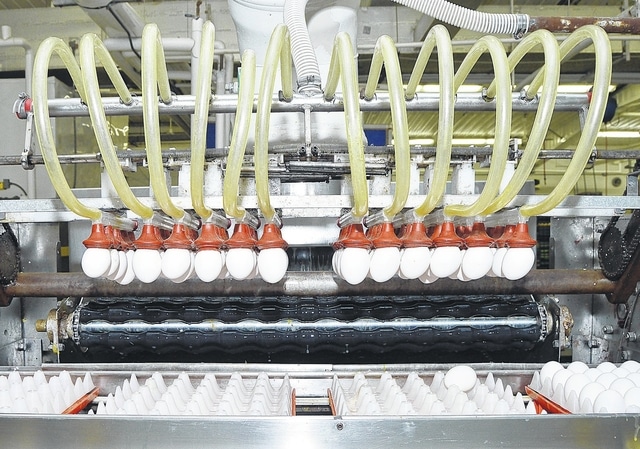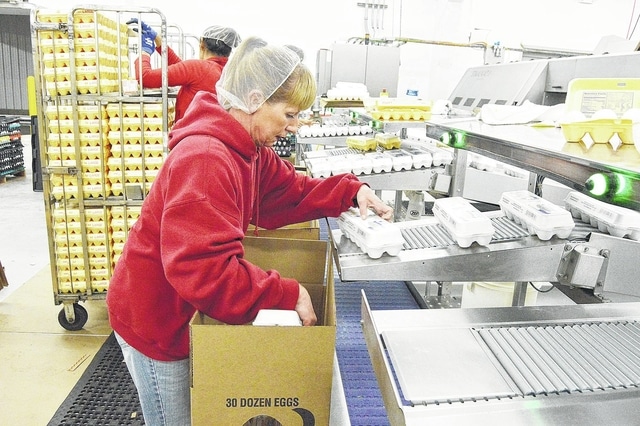

VERSAILLES — When many people in western Ohio think about the avian influenza outbreak of last spring, they remember that it forced agriculture officials at the state level to cancel poultry exhibits at every county fair of 2015.
The 4-H members who had bird projects made posters about them instead. But the disease, which killed 30 million fowl in Iowa, Minnesota, South Dakota and Wisconsin, had more serious ramifications in Ohio than disappointed youngsters. It served as a wake-up call to poultry and egg producers.
“There’s nothing like seeing 4 million hens in one pile to focus your attention,” said Dr. Simon Shane, of Durham, North Carolina, a veterinarian and retired academic who is a leading independent consultant in the poultry and egg industries.
That’s why Weaver Bros. Inc., a major egg producer headquartered in Versailles, has invested $8 million in biosecurity measures that will be complete next year.
“We’re working vehemently to minimize our risk,” said President Tim Weaver. “We’re trying to improve our prevention measures.”
No bird flu cases have been found in Ohio yet, and Weaver is taking every step possible to keep the disease from showing up at Weaver farms and production facilities. Those steps have been determined by a biosecurity team led by National Sales Manager Bob Gornickec, with advice from Shane.
“Mr. Weaver appreciates the need for scientific input at his company,” Shane said. “They’ve followed all my suggestions. Weaver Bros. were the most receptive of all the companies I consulted. There is a prevailing disinclination to commit capital to improvements. Weaver Bros. have always been progressive in that regard.”
To protect the company’s 7.5 million chickens and its 300 employees, as well as its customers, Weaver Bros. has already done away with gravel driveways and parking lots at its five farms. They’ve all been paved with asphalt.
“The virus will live less than a day on asphalt,” Weaver said. In addition, a strict no-visitor policy has been enforced at the farms, which have lockable gates at each entryway, and every vehicle that enters farm property is sprayed with disinfectant immediately. That means employees’ cars are sprayed every day.
Truckers entering Weaver Bros. properties must show that their semis have been washed at a commercial truck wash within an hour of their arrival, and then the trucks are sprayed upon entry.
The company has purchased plastic pallets, egg trays and divider boards for the contract and independent farmers it works with. That equipment is stored in a recently purchased warehouse in Russia, miles away from the chicken farms.
“We are building a 12,000-square-foot warehouse to house the machinery to clean those materials,” Weaver said. The firm is almost ready to close on a land purchase that will house an onsite truck wash and baking facility, in which trucks will be cleaned and then heated to 110 degrees for 30 minutes to kill any organisms on them.
Shower facilities have been installed at some farms and will soon be complete in all the Weaver farms. Employees arrive at work, take a shower and put on company clothing, then shower again and put on their own clothes before leaving for the day. No one is allowed to leave the premises during the workday. The shower-in/shower-out process necessitates increased laundry facilities.
Weaver doesn’t think any of these measures is extreme.
“Producers are responsible for preserving the health of their farm. There’s no insurance. If you get (bird flu), the government takes over the facility,” he said. “We learned our industry’s existing measures were insufficient. We had to raise our standard of care.
The U.S. Department of Agriculture reviewed the projects. The leadership team, including Gornickec, Processing Plant Manager Alex Weaver, Feed Mill Plant Manager Steve Langston, Special Project Manager Jeff Schwieterman and Compliance and Processing Manager Chuck Jenkins, have worked closely with the Ohio Department of Agriculture (ODA) to develop the biosecurity plans.
“They were very pleased,” Weaver said, of the ODA.
Weaver Bros. is a fourth-generation, family-owned business that began in 1929. It markets 2.2 billion eggs per year from its own farms, contract farms and independent family farms to 16 midwestern, northeastern and southeastern states. In addition, the firm owns a third of Opal Foods, an egg producer in Colorado and Missouri, and 50 percent of CW Egg Products in Fort Recovery.
The company does its own grain farming and pullet-rearing and much of its own egg-laying processes. It operates four egg-processing plants.



